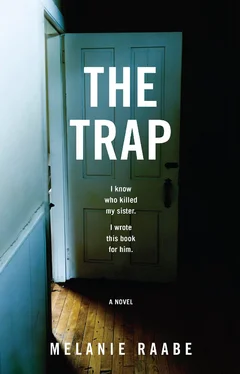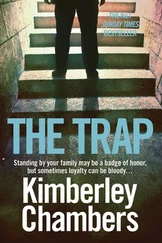“When Beethoven conducted the Ninth for the first time and the final notes died away, the audience behind him went wild with excitement. But Beethoven couldn’t hear them. He turned around to face the audience, unsure how his symphony had been received. It wasn’t until he saw the ecstatic faces that he knew it was good.”
“Wow,” I say.
“Yes,” the driver replies.
Then the taxi gives a jolt and we stop.
“Here we are,” the driver says.
He turns around and looks at me. I look back.
“Good,” I say.
I leave the protective cocoon of the car and it immediately vanishes into the darkness. I’m on the edge of town, in a quiet, well-heeled residential area. Bigger houses than in my parents’ street. Avenues of chestnut trees.
I recognize Lenzen’s house. I know it from photographs taken in the early stages of my plans by a private detective I had charged with finding out as much as possible about Lenzen, his family and his social milieu.
For the third time on this strange evening, I’m walking up a gravel path. But this time my knees aren’t trembling, my heart isn’t racing. I am calm. The sensor goes off and lights up my way. I climb the two steps to the front door. Inside, a light is turned on, and even before I have time to ring the bell, Victor Lenzen opens the door to me.
Those pale, clear eyes.
“I should have known you’d come,” he says, and lets me in.
I have reached the end of my journey. Victor Lenzen is standing before me, only an arm’s length away.
He has closed the front door behind him, shutting out the world. We are alone.
Lenzen seems changed. He is wearing a black shirt and jeans. He looks like an aftershave ad. Those pale blue eyes that I knew I would never forget, when I saw them for the first time, all those years ago in Anna’s flat — how could I ever have doubted myself?
“What are you doing here, Linda?” asks Lenzen.
He seems to me a touch shorter than when we last met. Or do I feel taller?
“I want the truth,” I say. “I deserve the truth.”
For a second or two, we stand there, looking at one another. The air between us seems to vibrate. The moment drags on painfully; I endure it. Then Victor Lenzen looks away.
“Let’s not talk here,” he says.
He sets off down the hall and I follow him. His house is large and empty. It looks as if he were about to move out — or as if he’s never really moved in.
I wonder what he’s thinking as he walks ahead of me, feeling my presence behind him. The fact that I’m here means that I’ve seen through him, that it’s not yet over for him, that it’s going into the next round.
He’s making an effort to appear calm. But his thoughts must be going haywire. We walk along a corridor hung with large-format grainy black-and-white photographs. The sea at night, the back of a woman’s curly head, a snake shedding its skin, the Milky Way, a black orchid and the astute-looking face of a fox accompany me on my way. Then we climb a short flight of free-standing stairs to Lenzen’s living room.
A designer lamp in metal and Perspex bathes the room in cool light. There is no television. There are no bookshelves, no plants. Just leather, glass and concrete. Designer furniture, two leather armchairs, a glass table and abstract art in blue and black. A faint smell of cold smoke hangs in the air. There is an adjoining open-plan kitchen. The room leads onto a balcony that is shrouded in darkness.
“Please,” Lenzen says. He indicates an armchair. “Sit down.”
“You should be aware that other people know I’m here,” I say. It is my only trump.
“If I don’t get in touch with them, they’ll come and look for me.”
Lenzen’s cold eyes narrow. He nods ponderously.
I take a seat. Lenzen sits down opposite me on the other armchair. We are separated only by the coffee table.
“Would you like a drink?” Lenzen asks.
He seems confident that I am unarmed. Presumably because he sank my gun in Lake Starnberg.
“No, thanks.”
I won’t let myself be distracted — not this time.
“You aren’t surprised to see me,” I say.
“Not really.”
“How did you know I’d come?”
“I guessed you weren’t anything like as ill as you made out,” he says.
He shakes a cigarette out of a packet that’s lying on the coffee table and lights up.
“Would you like one too?” he asks.
“I don’t actually smoke,” I say.
“But the main character in your book — she smokes,” says Lenzen and places a cigarette on the coffee table between us, along with his lighter.
I nod, take the cigarette, light up. We smoke in silence. A cigarette-long grace period (it seems we’re both thinking the same) before we bring this to an end. I smoke mine down to the last millimeter before stubbing it out, steeling myself for the answers to my questions.
I don’t know why, but I have the feeling that Lenzen is going to give them to me now that the time for games is over.
“Tell me the truth,” I say.
Lenzen doesn’t look at me; he’s staring at an indeterminate spot on the floor.
“Where were you on 23 August 2002?”
“You know where I was.”
He lifts his gaze. We look each other in the eyes, like all those years ago. Of course I know where he was. How could I ever have doubted it?
“How did you know Anna Michaelis?”
“Are we really going to carry on like this? With these stupid questions?”
I swallow. “You knew Anna,” I say.
Lenzen lets out a deep rumble — his mirthless version of a laugh. “I loved Anna,” he says. “But did I ‘know’ her? To be perfectly honest, I have no idea. Probably not.”
He snorts, grimaces, then throws back his head and lets it circle, making his vertebrae click. He lights another cigarette. His fingers are trembling. Only slightly. I try to digest his words.
I hear Julian’s voice in my head: “A crime of passion. So much anger, so many knife wounds, always point to a crime of passion.” And my reply: “But Anna wasn’t in a relationship. I’d have known.”
Oh, Linda.
“You were…” I find it hard to say it, as if it were incredibly lewd. “You were in a relationship with my sister?”
Lenzen nods. I think of the small, flat smartphone, taped to my chest in a makeshift fashion and now recording everything, and I wish he’d reply. But he shows no sign of doing so. Only sits and smokes. Still he avoids looking me in the eye. And I realize that things have changed. Now he’s the one who can no longer endure my gaze.
“May I ask you a question?” I begin.
“That’s what you’re here for,” says Lenzen.
“Why did you come to my house?”
Lenzen stares into space. “You can’t imagine what it was like,” he says.
I twist my mouth wryly.
“The call to my editor: a famous author wanting to be interviewed by me. I didn’t know what was going on. I was vaguely familiar with the name Linda Conrads from the cultural pages, but apart from that it meant nothing to me.”
Lenzen shakes his head.
“The literary editor was offended at being ignored. He wanted to interview you himself, of course. I didn’t care. I was looking forward to the interview.”
Lenzen gives a bitter laugh. He takes a nervous drag on his cigarette and carries on talking.
“Ah well. Our trainee arranged a date for the interview and I got an advance copy of the book to prepare myself.” I’m quivering.
“So I read it. You know, the way you read something you have to read for work. Whenever I could snatch the time: on the train, on the escalator, a few pages in bed before going to sleep. I skipped a lot. I don’t much rate crime novels — the world is brutal enough as it is; I can do without books full of…”
Читать дальше












